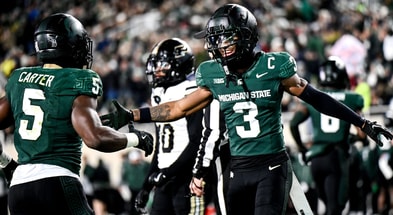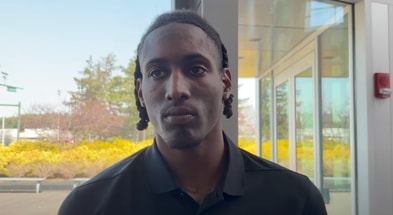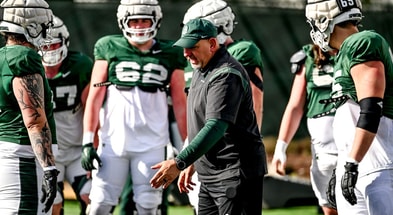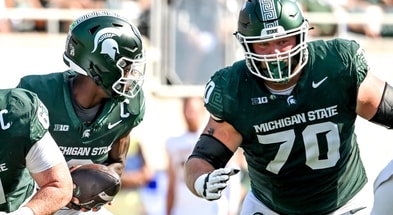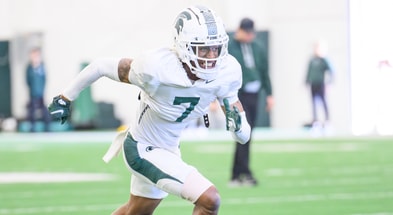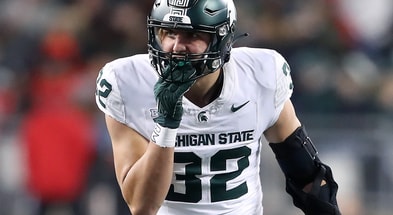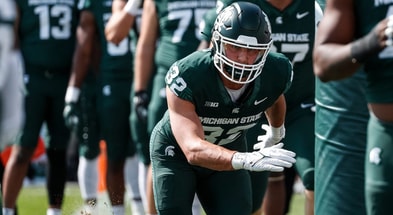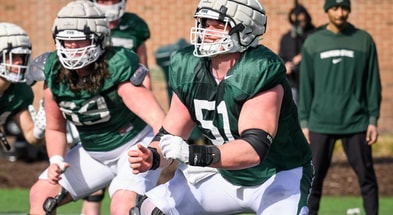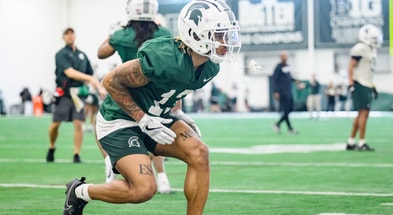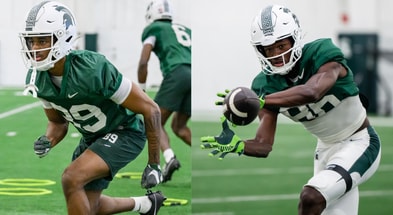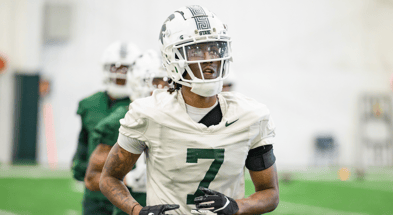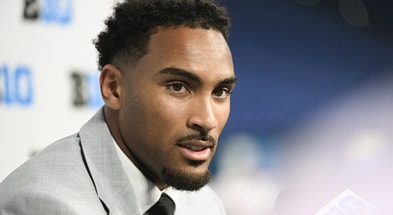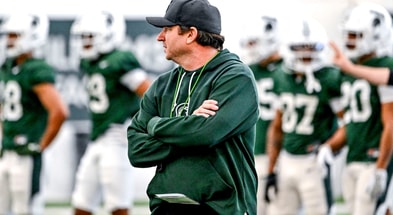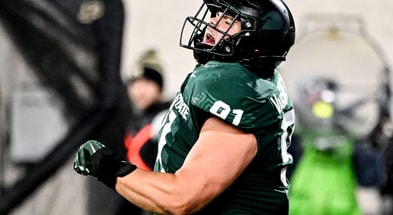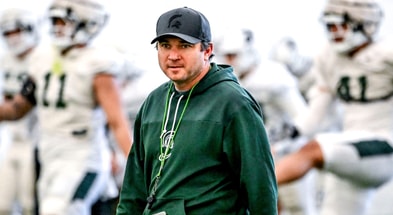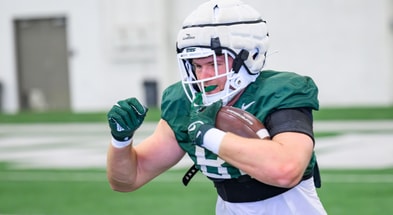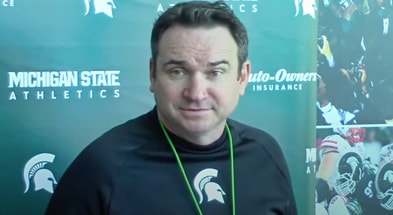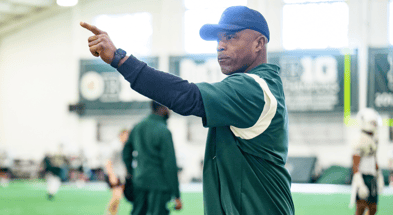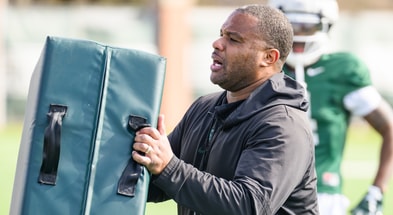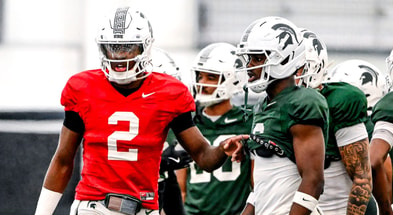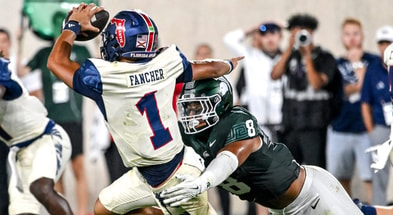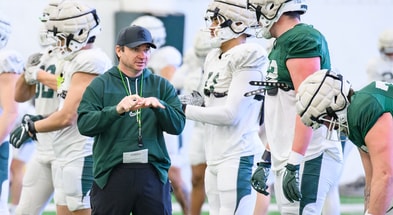Michigan State player's attorney calls Judge's decision "extreme" and "heavy-handed" at arraignment

The arraignment of five Michigan State football players on Friday on misdemeanor assault charges stemming from the tunnel incident in Ann Arbor on Oct. 29 resulted in a sharp verbal exchange between Judge Tamara Garwood and the lawyer for one of the Michigan State players.
The players and their lawyers appeared virtually before the judge on Friday morning.
Wade Fink, defense attorney for Michigan State defensive end Itayvion Brown, protested Garwood’s new restrictive orders against the players. Garwood ordered that the Michigan State players must have their lawyers present if the players have contact with one another outside of football purposes. Garwood ordered that the players could have contact with one another only for football purposes.
Brown, junior defensive back Justin White, junior defensive back Angelo Grose, senior defensive end Brandon Wright and freshman defensive end Zion Young, senior linebacker Jacoby Windmon and redshirt-sophomore Khary Crump were suspended by Michigan State football coach Mel Tucker in the days after the incident.
Brown, White, Grose, Wright, Young and Windmon were reinstated by Tucker late last week. Crump remains suspended while facing felony charges. Crump was arraigned for assault with a dangerous weapon on Tuesday, stemming from the tunnel incident following the Oct. 29 game between Michigan and Michigan State. Crump was seen on video swinging his helmet at Michigan football player Gemon Green during post-game scuffling.
With Brown, White, Grose, Wright, Young and Windmon allowed back in the football building for training purposes by Tucker, Judge Garwood put restrictions on the type of contact they can have with one another, drawing consternation from Fink.
Fink took exception to Garwood’s order that the players are not allowed to have contact with members of the Michigan football team. Fink took his protest a step further, contrasting the tight reaction to the tunnel incident to the comparative leniency shown to Michigan basketball coach Juwan Howard when he struck a Wisconsin assistant coach during a post-game scuffle last February.
“I don’t remember coach Juwan Howard being prevented from contacting the University of Wisconsin,” Fink told the judge during arraignment proceedings, according to The Detroit News. “I’m just a little troubled by the heavy-handedness of it, Judge. But that is your right.”
Charges were not brought against Howard for that on-court, post-game incident.
“Juwan Howard did not come in front of me,” Garwood said in response to Fink, according to The Detroit News. “Had he come in front of me, had that happened here and he was in front of me, he likely would’ve ended up with similar conditions.”
Top 10
- 1New
Johntay Cook
Headed to ACC
- 2Hot
Fan who fell from stands
20-year old former CFB player
- 3Trending
Donald Trump
Wants Saban back as Alabama HC
- 4
Kentucky, St. John's
Set to play in 2025-26
- 5
Bracketology
Way Too Early Tournament projection
Get the On3 Top 10 to your inbox every morning
By clicking "Subscribe to Newsletter", I agree to On3's Privacy Notice, Terms, and use of my personal information described therein.
In continuing to disagree with Garwood’s decision, Fink pointed out that the reason for the players’ actions or reactions in the tunnel after a “highly emotional sporting event” has not yet been examined publicly.
“To put these conditions on these kids and treat them as though they are a danger to anyone at the University of Michigan outside of the context of a highly emotional sporting event, when we don’t even know the facts of what the impetus was for this, I think is extreme,” Fink said, as reported by The Detroit News. “You’re talking about a highly-emotional situation. There is nothing to suggest that Mr. Brown is a danger to anyone. Quite the opposite. He is a gentle, kind, charitable young man who is good to his family, good to his friends, good to his program. I take issue that he is a danger to the University of Michigan, their coaches, their players, outside of the context of a fight that happens all the time.”
Scuffles or fights on the playing field or court during, before or immediately after games have traditionally been handled by sporting governing bodies and almost never reach the courts. The fact that the Oct. 29 incident took place just outside the playing surface and in the stadium tunnel heading toward the locker rooms could make this case a bit different. Lawyers representing Michigan State players feel it shouldn’t.
“This was a football-related incident that never should have been investigated by the police or charged by the Washtenaw County prosecutor,” Jack Kramer, attorney for Wright, told The Detroit News.
On Friday, Brown, Grose, White, Wright and Young each received $10,000 personal-recognizance bonds. They are scheduled to appear for a pretrial on Dec. 15 at the 15th Judicial District Court in Ann Arbor.

